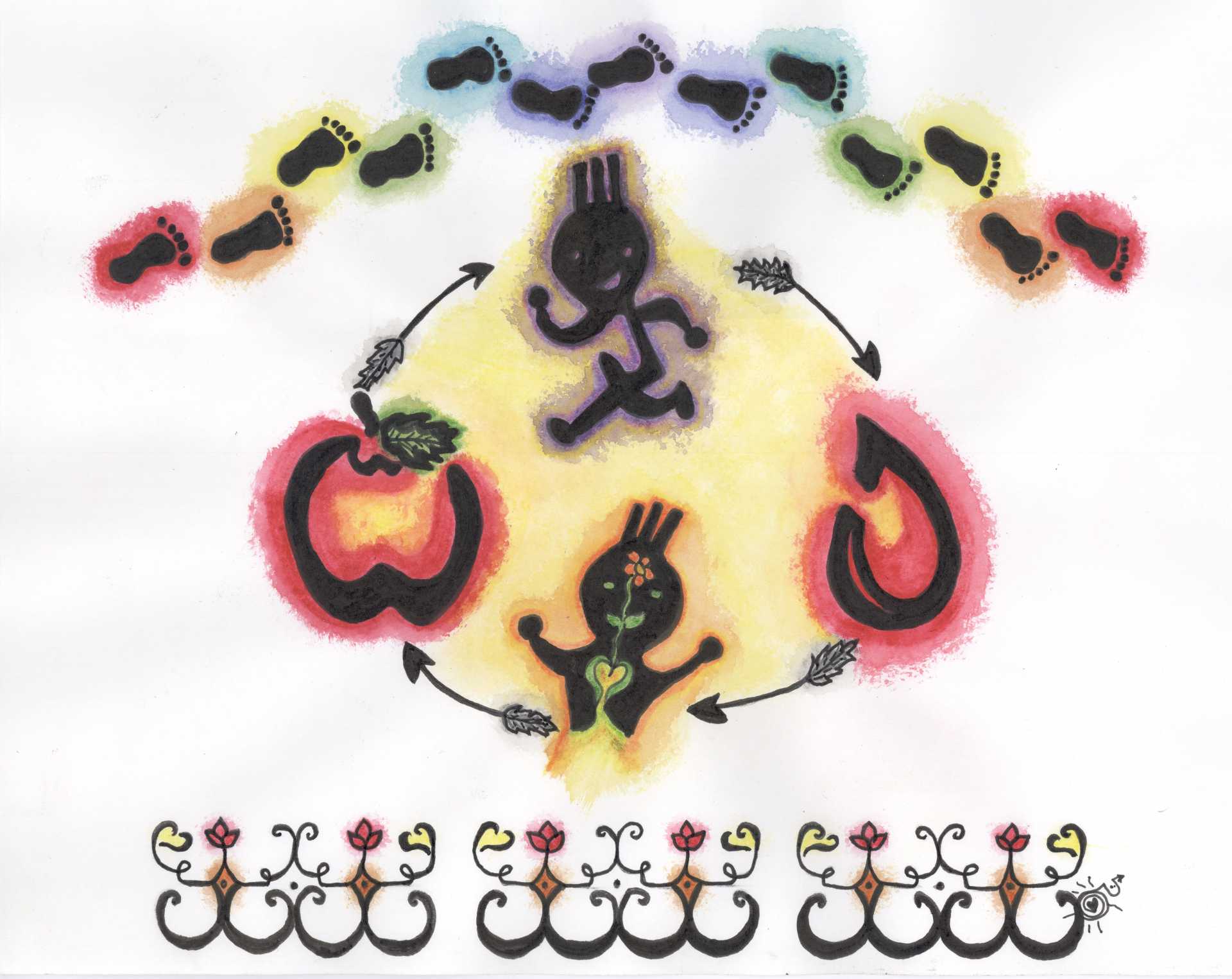


Health care, healthy eating, physical exercise, awareness of diabetes and of mental health issues are essential to caring for our “earthly shell” with kindness and gratitude.
Home / Module 8 / My body and health




Skicinuwok Kanata piyemi kisi sukolinhotuwok katok psiw piluweyak pomawsuwinuwok.


Indigenous people of Canada are more likely to develop diabetes than the general population.
Mec-al new kosona nan piyemi kisi psonomoniya Skicinuwihkuk.


The rates are about 4 or 5 times higher in First Nations communities.
Yuhtol spokimqil 'ci sukolinhotimok 'cessuwol elakumeq naka yut piliw piley micuwakon kisi acehtuhtit tan elihpultiyeq.


These high rates of diabetes are related to the genetic heritage of indigenous people and to the relatively recent introduction of new foods that have changed our eating habits.
Mecimi-te eluwe ktolitahatomonen yuhtol pileyal micuwakonol tahalu nanonul “wapeyikil micuwakonol”.


We often consider these new foods as the 5 “gifts from white people”.
Nihtol nit nukhomon, sukol, piksipon, salawey naka pocetesol.


They are: flour, sugar, lard, salt and potatoes.
Pemkiskahk, aqamok newatq tuciw amsqhahs petapasihtit piluwahkewinuwok, wisokeluk skicinuwok cuwawsultuwok wici sukolinhatimok.


Today, more than 400 years after first contact, many indigenous people have to learn to live with diabetes.
 ⎙
⎙
| Hok milihtasik | Parties du corps | Body parts |


| |||
|---|---|---|---|---|---|---|
| Hok | Corps | Body |


|
|||
| Nhok | Mon corps | My body |


|
|||
| Sakolomolsuwakon | Santé physique | Physical health |


|
|||
| Woniyakon | Tête | Head |


|
|||
| Noniyakon | Ma tête | My head |


|
|||
| Koniyakon | Ta tête | Your head |


|
|||
| 'Topskuhkiyil | Son cou | Neck |


|
|||
| Npahkamiskip | Mon cou | My neck |


|
|||
| Ktopskuhk | Ton cou | Your neck |


|
|||
| Tolomakonok | Épaules | Shoulders |


|
|||
| Wot | Ventre | Belly / Stomach |


|
|||
| Sisoq | Œil | Eye |


|


| ||||||
|---|---|---|---|---|---|---|
| Sisqol | Yeux | Eyes |


|
|||
| Calokoss | Oreille | Ear |


|
|||
| Calokossiyil | Oreilles | Ears |


|
|||
| Wihtun | Nez | Nose |


|
|||
| Piyehsuwol | Cheveux | Hair |


|
|||
| Katahqem | Jambe | Leg |


|
|||
| Katol | Jambes | Legs |


|
|||
| Sit | Pied | Foot |


|
|||
| Sitol | Pieds | Feet |


|
|||
| Pihtin | Main | Hand |


|
|||
| Pihtinol | Mains | Hands |


|
| Wolomomqot naka mocomomqot | Confort et inconfort | Comfort and discomfort |


| |||
|---|---|---|---|---|---|---|
| Tan ktolomolsin? | Comment te sens-tu? | How do you feel? | ||||
| Nulomols. | Je me sens bien. | I feel good. |


|
|||
| Ma-te nulomolsiw. | Je ne me sens pas bien. | I don’t feel good. |


|
|||
| Ma-te npehkitahatomuwon. | Je ne suis pas certain(e). | I’m not sure. |


|
|||
| Kikicey? | As-tu mal? | Are you in pain? | ||||
| Aha. Nkikicey. | Oui. J’ai mal. | Yes, I’m in pain. |


|
|||
| Ontama. Ma-te nkikiceyiw. | Non. Je n’ai pas mal. | No. I’m not in pain. |


|


| ||||||
|---|---|---|---|---|---|---|
| Tama ktoli kikicey? | Où as-tu mal? | Where do you hurt? | ||||
| Nsisqin. | J’ai mal aux yeux. | I have sore eyes. |


|
|||
| Ncalokossewin. | J’ai mal aux oreilles. | I have an earache. |


|
|||
| Koniyakonin? | As-tu mal à la tête? | Do you have a headache? | ||||
| Aha. Noniyakonin. | Oui. J’ai mal à la tête. | Yes. I have a headache. |


|
|||
| Ontama. Ma-te noniyakoninew. | Non. Je n’ai pas mal à la tête. | No. I don’t have a headache. |


|


| ||||||
|---|---|---|---|---|---|---|
| Qotakonin? | As-tu mal à la gorge? | Do you have a sore throat? | ||||
| Aha. Nqotakonin. | Oui. J’ai mal à la gorge. | Yes. I have a sore throat. |


|
|||
| Ontama. Ma-te nqotakoninew. | Non. Je n’ai pas mal à la gorge. | No. I don’t have a sore throat. |


|
|||
| Ktolamhokewin? | As-tu mal au ventre? | Do you have stomach ache? | ||||
| Aha. Ntolamhokewin. | Oui. J’ai mal au ventre. | Yes, I have a stomach ache. |


|
|||
| Ontama. Ma-te ntolamhokewinew. | Non. Je n’ai pas mal au ventre. | No. I don’t have stomach ache. |


|


| ||||||
|---|---|---|---|---|---|---|
| Nkeckulu. | J’ai le rhume / la grippe. | I have a cold / flu. |


|
|||
| Nposuwakonin. | J’ai de la fièvre. | I have a fever. |


|
|||
| Olotihkuwin. | J’ai des allergies. | I have allergies. |


|


| ||||||
|---|---|---|---|---|---|---|
| Sukol spiqte | Haut taux de sucre dans le sang | High blood sugar |


|
|||
| Nutsihpiluwet | Professionnel de la santé | Health professionnal |


|
|||
| Natsakiyan nutsihpiluwet. | Va consulter un professionnel de la santé. | Go seek medical attention. |


|
|||
| Kcicihtuwakon 'ciw sukolinhotimok | Signes possibles du diabète | Possible signs of diabetes |


|
|||
| Mecimi te kotuwossom. | Tu as toujours soif. | You are always thirsty. |


|
|||
| Kmecimisk. | Tu as besoin d’uriner souvent. | You need to pee often. |


|
|||
| Kotuks memihpiyin. | Tu te sens fatigué après avoir mangé. | You feel sleepy after you eat. |


|
|||
| Keq cuwi-olluhkiyin ihyyon sukolinewey | Choses importantes à faire lorsque l’on vit avec le diabète | Important things to do when you have diabetes |


|
|||
| Kinuwihp | Diète | Diet |


|
|||
| Ktopinomon keq miciyin. | Surveille ton alimentation. | Watch what you eat. |


|
|||
| Poneqeht 'tomitahasuwakon. | Réduire le stress. | Reduce stess. |


|
| Piyemelok kmicin … | Manger plus de … | Eat more … |


| |||
|---|---|---|---|---|---|---|
| Psqeyihtit skonimineyak opanok naka spasihpuweyal. | Pains et céréales à grains entiers. | Whole grain breads and cereals. |


|
|||
| Pili-minkasikil naka kihkaneyal. | Fruits et légumes frais. | Fresh fruit and vegetables. |


|
|||
| Nuta-wihkewikil molaqseyal. | Produits laitiers sans gras. | Low fat dairy products. |


|
| Kat-cu miskiw micihkoc kosona kotuhsomihkoc … | Manger et boire moins de … | Eat less of … and drink less of … |


| |||
|---|---|---|---|---|---|---|
| Minkaseyal pelkopahakil naka kawatokupiyil. | Jus de fruits et boissons sucrées. | Fruit juice and soft drinks. |


|
|||
| Wapeyit opan. | Pain blanc | White bread. |


|
|||
| Kisacihtasik micuwakon. | Nourriture transformée. | Processed food. |


|
| Cuwitpot ktakuwami ewehkosskehlosin. | Tu devrais faire plus d’exercice. | You should exercise more. |


| |||
|---|---|---|---|---|---|---|
| Yaluhs qocomok. | Marcher dehors. | Walk outside. |


|
|||
| Yalakomahsin. | Faire de la raquette. | Snowshoe. |


|
|||
| Tkahsom. | Nager. | Swim. |


|
|||
| Yalisuk. | Pagayer. | Canoe. |


|